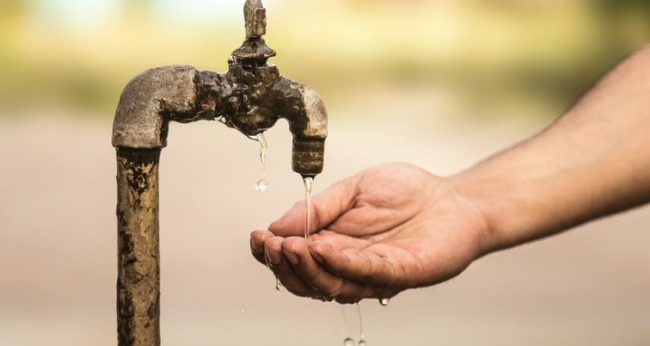
COVID-19 will unquestionably delay achievement of the Sustainable Development Goals (SDGs), the latest global attempt to improve the quality of life of billions of people around the world by 2030.
受新冠疫情的影响,事关数十亿人生活质量的全球性发展目标,即2030年联合国可持续发展目标(SDG)的实现无疑将会延迟。
Increasing access to clean water and sanitation are among the 17 SDGs. During normal times, and even more during the present pandemic, access to clean water and proper sanitation is essential.
提高清洁饮用水和卫生设施的普及率是十七个可持续发展目标之一。除了可以提高日常生活质量,安全饮水和卫生设施在疫情大流行期间显得更加重要。
But we must now rethink how we achieve the goals laid out in the SDGS. First, we should stop looking at access to safe water as the problem of developing countries alone – it is a global problem that worsens under extreme conditions like the current pandemic.
也许我们现在应该重新思考如何实现这些可持续发展目标,我们首先要认识到饮水安全不仅仅只是发展中国家的问题,这实际是一个全球性的问题,在疫情流行这样的极端情况下会更加突出。
How COVID-19 heightens water problems
新冠疫情如何加剧水问题
During the current pandemic, a lack of clean water for drinking and proper hygienic practices has become a major concern for cities in the developing world, especially in slums, periurban areas and refugee camps. Countries in Africa and South Asia, with some 85% of the world’s people live, face particularly daunting challenges to access clean, drinkable water.
在当前的疫情大流行期间,缺乏清洁饮用水和卫生条件已成为一些发展中国家的城市,特别是贫民居住区、城市周边或难民营所面临的主要问题。约占世界人口85%的非洲地区和南亚地区的安全饮水和卫生条件也令人担忧。
But the problem is not confined to these areas. Developed countries are increasingly facing similar concerns. After catastrophic experiences with water utilities in Flint in 2014 in the US, and in 2000 in Walkerton, Canada, which seriously affected the health of a large number of people, millions in these two countries are now using point of treatment systems in their homes to further purify city water. They are also buying bottled water because they perceive it to be cleaner and safer. In overwhelming percentage of cases of people in developed countries, from Japan and Singapore to western Europe and the US, are doing this out of choice and not because they have to.
在其他地区,一些发达国家也开始面临类似的问题。2014年发生在美国弗林特(Flint),2000年发生在加拿大沃克顿(Walkerton)的城市供水事故对许多人的健康造成了不利的影响,目前美、加两国有数百万人使用家庭净水系统对城市自来水进一步进行处理,而日本、新加坡、西欧等发达国家有越来越多的人选择饮用瓶装水,因为他们认为瓶装水更干净、更安全。
But the financial impact of lockdown and growing unemployment means that spending extra on safe water has become a problem for many households – and millions are struggling to pay their utilities bills, including for water.
对很多家庭来说,疫情流行期间的封城和失业率上升意味着获得安全饮用水的额外支出也成为了家庭的经济负担,数百万人甚至难以负担自己的日常开支,其中就包括水费。
In the US, some 57 million people in several states have been allowed to continue receiving water from their utilities even if they cannot currently pay for it. But there are still many poor and disadvantaged people who did not have access to water services before the pandemic, and still do not have them.
根据美国一些州政府的规定,允许大约有5700万人在无法及时支付水费的情况下,仍然可以继续使用城市供水服务。但是对于那些在疫情爆发之前就无力负担自来水的家庭,还是无法获得清洁的饮用水。
In the European Union (EU), most member states need to increase their annual water supply and sanitation expenditure by more than 25% to comply with EU Drinking Water and Urban Wastewater Treatment Directives. This will also contribute towards reaching the SDGs. But in these uncertain times, the EU will have to rethink how best to make use of scarce financial resources to achieve their goals.
对于大多数欧盟国家来说,为了落实“欧盟饮用水和城市污水处理指令”大概需要增加25%的供水与卫生预算,这也是实现联合国可持续发展目标的要求。但是在这个不确定的时期,欧盟也许不得不重新考虑如何更好的利用其有限的财政资源来实现其目标。
The pandemic has further worsened the living conditions and health of millions of people in both developed and developing countries, and it is unclear when this situation might improve. Even in the world’s richest country, USA, at least two million people still do not have access to piped water.
疫情的流行对发达国家和发展中国家数百万人的生活和健康带来了不利的影响,目前也无法预测情况何时会好转。即使在世界上最富有的国家美国,也至少有200万人没有自来水。
The need for leadership
需要加强领导力
From the late 1970s, the United Nations have advocated for improved source of water. But this term does not mean clean and safe water, even though UN organisations use these terms interchangeably.
从1970年代后期开始,联合国一直在倡导提高水源质量,但是这个说法并不等同于清洁用水和安全用水,虽然联合国的机构有时也交替使用这些术语。
COVID-19 has focused global attention to clean water for frequent handwashing, drinking and personal hygiene. Political leaders will now have to give increasing attention not only to access to water but also to its quality. It will be an even more daunting task, in both developed and developing countries, to regain the trust of their people that water they are receiving is safe to drink and for personal hygiene because of extensive past mismanagement in most countries of the world.
新冠疫情让全世界认识到洗手、饮用水和个人卫生都需要清洁的水源。各国政府现在不仅要重视提高用水普及率,还要重视水的质量。不论是发达国家还是发展中国家,让人们重新建立对饮用水和卫生用水安全可靠性的信任都是一个巨大的挑战,因为以前有过太多的失败的案例。
The world needs leadership, long-term sustainable policies, robust legal and regulatory systems, strong institutions, and services that are reliable and provided irrespective of the circumstances. For example, Singapore ensured all these conditions were fulfilled from 1965 onwards. As a result, its water management is now one of the best in the world.
这个世界需要的是领导力、长期稳定的可持续发展政策、健全的法律和法规体系、强有力的执行机构以及可靠的服务。1965年以来,新加坡一直在向这样方向努力,新加坡的水管理目前也是世界上最好的水管理之一。
The absence of enlightened political leadership in nearly all countries of the world, both developed and developing, will exacerbate the problem in the coming decades because of increasing uncertainties due to both expected events like climate change and unexpected ones like COVID-19.
世界上大多数国家都需要进一步提高其政治决策和领导力,以应对未来几十年的不确定性,既包括可以预期的气候变化问题也包括无法预期的新冠疫情等意外事件。
Water affects all aspects of life, economic activity and ecosystems. As the British-American poet, W.H. Auden wrote: “Thousands have lived without love but none without water.”
水问题涉及生活、经济活动和生态系统的各个方面。正如诗人奥登写道:“没有爱情人生也许还可以继续,可没有水就不行。
Cecilia Tortajada, Senior Research Fellow, Institute of Water Policy, Lee Kuan Yew School of Public Policy, National University of Singapore. Asit K. Biswas, Visiting professor, University of Glasgow.
Chinese translation of the opinion piece published by the The Conversation, June 8, 2020.